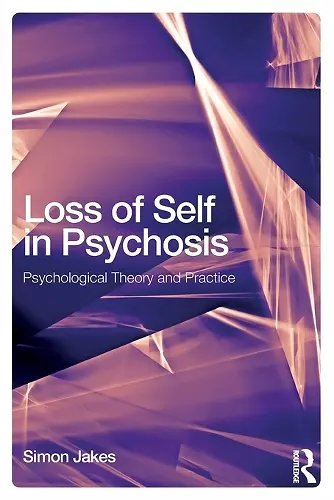Loss of Self in Psychosis
Psychological Theory and Practice
Format:Paperback
Publisher:Taylor & Francis Ltd
Published:29th May '18
Currently unavailable, and unfortunately no date known when it will be back
This paperback is available in another edition too:
- Hardback£125.00(9781138680128)

In Loss of Self in Psychosis: Psychological Theory and Practice Simon Jakes takes a critical look at contemorary approaches to the psychology of psychosis. In doing so, he explores how these vastly different approaches, as well as our numerous conceptualisations of schizophrenia, work to reduce the effectiveness of CBT as a treatment.
Four different psychological approaches to psychosis are examined in the first part of this book, as well as the development of CBT for psychosis and the theory behind this. In the second part, he describes the therapy of some clients and suggests that incorporating ideas from some of the different theories of psychosis in the same treatment may be beneficial.
Using extended examples from clinical practice over the past 20 years to illuminate his theories, Loss of Self in Psychosis: Psychological Theory and Practice will prove to be thought-provoking reading for clinical psychologists, psychiatrists and other mental health professionals working with this client group.
"In this book, Simon Jakes offers a refreshingly open-minded discussion of ways to describe and explain the experiences of people described as psychotic. The strength of the book resides in the fact that the author has for many years worked therapeutically with people whose difficulties are of this nature, and he illustrates his arguments by referring to case examples. The book delves deeply into the credibility of the rationale of CBT therapies, psychoanalytic models, ideas from cognitive neuroscience, and relevant philosophical speculations. The book brings together empirical evidence, clinical observation, and conceptual reasoning in a way that is rarely done in applied psychology.
Simon Jakes adopts an anarchic attitude to the ideas he summarises, citing the philosopher of science, Feyerabend, as his inspiration. In the second half of his book he attempts to make sense of the life histories and presenting problems of a number of clients that he has worked with over an extended period. Therapists who work with a similar group of clients should find these eclectic applications of theory to practice useful and thought-provoking."
Richard Hallam. Independent practitioner and researcher.
A thoroughly researched and highly readable book, which critically and refreshingly examines the psychological and philosophical models of psychosis and the self. Written with great humanity and wisdom the author’s extensive practical expertise in the field shines through. It makes one eager to read on to discover more of the mysteries of psychotic presentations.
The material is logically organised and full of real life examples. The case histories at the end add value. This book will help both expert and budding clinicians gain fresh insight into this complex disorder.
Dr Renate Wagner, Clinical Psychologist
ISBN: 9781138680135
Dimensions: unknown
Weight: 240g
140 pages